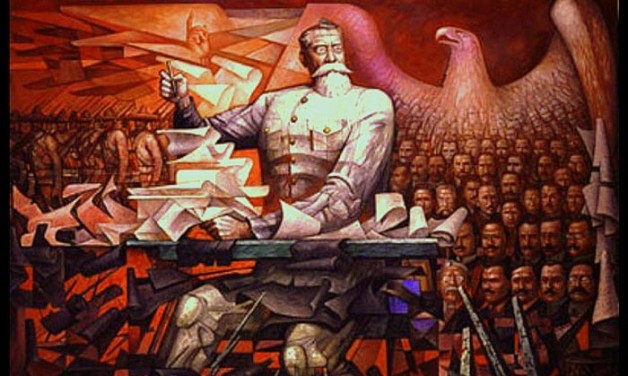The party banners back in storage, the arena floors swept clean of confetti, tears wiped from cheeks, voices hoarse from enthusiastic cries of affirmation, hopes rekindled, bonds of solidarity solidified, party identities intensified—yes, the Republican and Democratic Conventions have finally come to a close. The party members have emerged with a renewed sense of pride, hope, and purpose. They have seen their candidate transfigured in the glow of flat-screen plasma, and now, as they descend the mountain, their eyes slowly adjust to the dim light of the apathetic masses.
The multi-million dollar political convention is easy fodder for satire. Playing upon fears, manufacturing new hopes, using all the psychological tools in the propagandist’s toolbox, each party invites us to identify ourselves more deeply with its cause. But how deep is too deep? How loyal is too loyal? Where is the line between rational allegiance and irrational fanaticism? Given the current climate of apathy, such questions might seem irrelevant, but, then again, fanaticism continues to thrive in our culture—and not only in the political sphere. Consider the NFL devotee, the imbalanced patriot, the sub-culture punk, and the fraternity zealot. Paradoxically, fanaticism thrives in the soil of apathy, for while apathy isolates, fanaticism unites.
Everyone has a natural longing for the good of community, the good of belonging to a fellowship united in pursuit of a common goal. This desire for communion lies at the very heart of what it means to be human. Any party, society, or fan base appeals to this desire. A common ideal, purpose, or hope can forge powerful social bonds, and these bonds can be irresistibly attractive to the soul stunted by radical individualism and languishing in existential loneliness. Starving for solidarity, mistaking the means for the end, many are tempted to value their membership in a party, society, or fraternity in a way disproportionate to the actual good at stake. The game ceases to be just a game. The candidate ceases to be just a candidate.
When we invest ourselves in a communion, we give ourselves away—for at the heart of communion is love. Many different communities vie for our hearts, and rightly so. The common good depends upon a diversity of social groups: the family, the parish, the classroom, the business, even the political party. And, of course, we give ourselves to each of these on different levels. For example, I am a Purdue Boilermaker, but I’m also an American, a Verner, a Dominican, a Christian, and so on. The hierarchy that governs our various social “identities” is very important, because conflicts among them are inevitable.
The manner in which we navigate these conflicts reveals the depth and order of our loves. You say you belong to a political party, but which do you belong to more: the party or Christ and his Body, the Church? You say you are a diehard NFL fan, but which do you belong to more: your team or your family? Granted, we can have many allegiances, and they need not always compete with each other; but ultimately we must choose which allegiance is absolute. When all is said and done, to whom do we belong? Who will it be?
United in the faith, hope, and love of our Lord Jesus Christ, we do well to be wary of any propaganda—political, corporate, patriotic, or otherwise—which demands of us a loyalty that would usurp communion with our one true Master. When He comes again in glory, He will need no plasma screens, confetti, or soul-stirring music. Resplendent in the glory of the only-begotten Son of God, He will come on the clouds to judge the living and the dead. At that moment, as we stand naked before his majesty—though we will have belonged to many people and many communities in the pursuit of many necessary goods—let our lives proclaim with joy and resolution, “Lord, we belong to you!”
✠
Image: Jorge González Camarena, La Constitución de 1917







